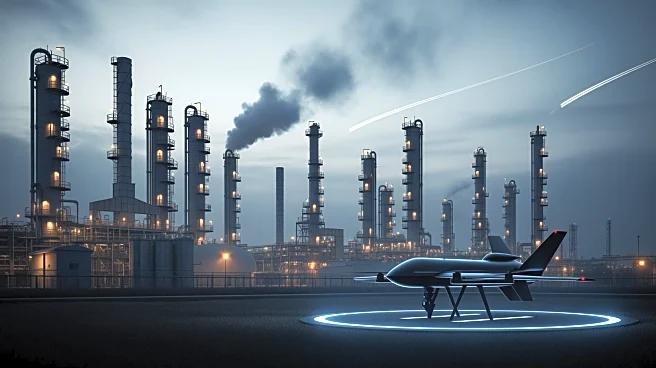What's Happening?
Ukraine's Defense Forces have executed strategic strikes on key Russian military logistics sites, including the Novokuybyshevsk oil refinery in the Samara region and a drone storage site linked to the Rubikon
unit. The General Staff of the Armed Forces of Ukraine reported that these operations were designed to disrupt Russia's fuel supply and unmanned systems capabilities. The Novokuybyshevsk refinery, a major fuel-production facility with an annual processing capacity of approximately 9 million tonnes, was hit, resulting in explosions and a fire. Additionally, Ukrainian forces targeted a fuel-transfer station in the occupied Donetsk region. These actions are part of Ukraine's ongoing efforts to weaken Russia's military supply chain and force a cessation of aggression.
Why It's Important?
The strikes on the Novokuybyshevsk oil refinery and Rubikon drone base are significant as they directly impact Russia's ability to sustain its military operations. By targeting fuel production and drone storage facilities, Ukraine aims to degrade Russia's logistical capabilities, potentially reducing its offensive power. This could shift the dynamics on the battlefield, affecting Russia's strategic planning and operational effectiveness. The disruption of high-grade aviation fuel supply is particularly critical, as it may hinder Russia's air operations. These developments underscore Ukraine's strategic approach to leveraging its military capabilities to counter Russian aggression.
What's Next?
Ukraine's Defense Forces have indicated that they will continue operations to undermine Russia's military potential. The ongoing strikes suggest a sustained campaign to target critical infrastructure supporting Russian military efforts. As Ukraine intensifies its military actions, Russia may respond with increased defensive measures or retaliatory strikes. The international community, particularly NATO and EU member states, will likely monitor these developments closely, considering potential implications for regional security and stability. Diplomatic efforts may also intensify to address the conflict and seek resolutions.
Beyond the Headlines
The strategic targeting of Russia's military logistics by Ukraine highlights the evolving nature of modern warfare, where infrastructure and supply chains are critical components. This approach raises ethical and legal questions about the conduct of war and the impact on civilian infrastructure. The long-term implications could include shifts in military strategy and increased focus on protecting critical infrastructure from attacks. Additionally, these actions may influence international perceptions of the conflict and affect diplomatic relations between Russia and other nations.









